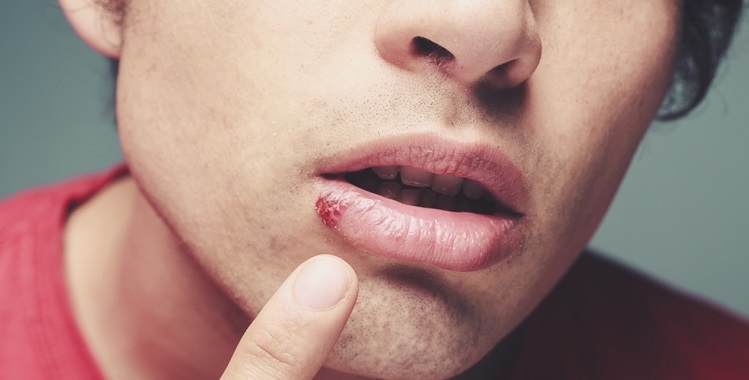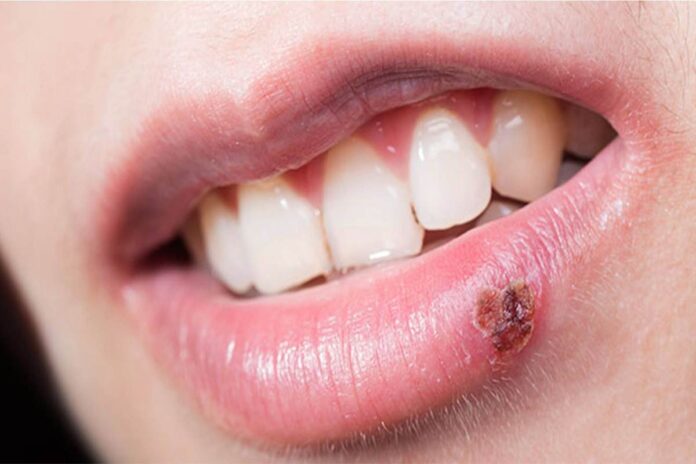Cold sores are tiny, often painful blisters that occur most frequently on the lips and adjacent skin, though occasionally on gums or even the nose or cheek. Inflammation, burning, itching, or a tingling sensation often precede the blister by a couple of days. A small red area then develops, followed by a blister or group of tiny blisters that fill with liquid. The blisters are often painful, itchy, or both. They typically rupture within a few days, followed by crusting.
Table of Contents
What causes cold sores?
Cold sores are caused by the herpes simplex virus (HSV)—usually by HSV Type 1, but sometimes by the Type 2 virus more commonly associated with genital herpes. Although the virus is infectious, most people have already caught it by the time they are in their early 20s (albeit frequently without showing any symptoms). The virus lies dormant in the body until it is triggered by factors such as a cold, fatigue, stress, injury, or fever—hence the nickname fever blisters. Cold sores can also be caused by hormonal changes accompanying the menstrual cycle. But in many cases the triggering factor isn’t known.
Also Read: Should you pop a Blister?
What if you do nothing?
Cold sores, although unsightly, pose no health threat and will clear up on their own within seven to 10 days.
Home remedies for cold sores

Docosanol (Abreva) is an over-the-counter remedy approved by the FDA for treating cold sores. By applying this topical cream as soon as the telltale symptoms of a cold sore occur, you may be able to prevent the blister from developing or, if it does appear, shorten the time it takes to heal (though the drug won’t help everyone). For severe outbreaks, prescription medications are likely to offer the most benefit.
Also Read: What Are Mouth Sores And How To Cure Them?
Other alternative products (such as the amino acid lysine, probiotics, and zinc supplements) have been suggested for treating cold sores, but there is no evidence that they work.
The following treatments might ease the pain of a cold sore:
- Rinse with salt water. Rinse your mouth several times a day with a cup of warm water to which you’ve added a half teaspoon of salt.
- Try ice. Applying an ice cube to the affected area may help relieve pain. Wrap an ice cube in a damp washcloth and keep it on the area for five minutes. Reapply it every hour.
- Apply an ointment. An over-the-counter analgesic or anesthetic ointment can help relieve pain.
- Don’t pick. Do not squeeze, pick, or pinch a blister or scab. A light coating of petroleum jelly or cocoa butter on the scab will prevent cracking and bleeding.
- Wash carefully. This will help prevent infection. Avoid touching your eyes, genital area, or another person after touching the cold sore.
How to prevent cold sores
- Use sunblock. Outbreaks due to sun exposure can be prevented by applying sunscreen with a sun protection factor (SPF) of 15 on the lips before going outside and reapplying it frequently during the day.
- Avoid touching the blisters. The virus may be transferred by touching the blisters and then other persons. Kissing is one of the most common ways this transmission occurs.
- Don’t share. During an outbreak, don’t lend personal items such as towels, razors, cups, toothbrushes, or lip balm.
- Consider medication. If you get frequent outbreaks, speak with your doctor about taking a prescription antiviral drug for prevention.
When to call your doctor about cold sores
If you get a fever, if your cold sores persist for more than two weeks despite therapy, or if they reoccur regularly over the course of a year, speak with your doctor.
What your doctor will do
After a careful examination, your doctor may prescribe Xerese, a topical cream that combines the antiviral drug acyclovir and a corticosteroid. Your doctor may also prescribe topical acyclovir (Zovirax), orpenciclovir (Denavir), or another antiviral cream to help speed the healing of your cold sores.
If you get frequent cold sores, ask your doctor about oral acyclovir (Zovirax), a prescription antiviral medication that can help reduce the severity and duration of cold sores if taken when the first warning signs (itching and tingling) appear. As preventative medicines, famciclovir (Famvir) and valacyclovir (Valtrex), two related oral medications, are also employed.
Also Read: Canker Sores: Causes and Treatments




